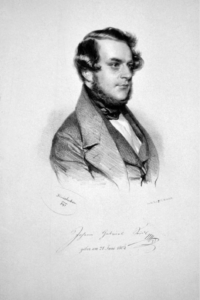Night song in the forest
(Poet's title: Nachtgesang im Walde)
Set by Schubert:
D 913
for TTBB quartet and 4 horns[April 1827]
Sei uns stets gegrüßt, o Nacht!
Aber doppelt hier im Wald,
Wo dein Aug verstohlner lacht,
Wo dein Fußtritt leiser hallt!
Auf der Zweige Laubpokale
Gießest du dein Silber aus,
Hängst den Mond mit seinem Strahle
Uns als Lamp’ ins Blätterhaus.
Säuselnde Lüftchen sind deine Reden;
Spinnende Strahlen sind deine Fäden;
Was nur dein Mund beschwichtigend traf,
Senket das Aug und sinket in Schlaf!
Und doch, es ist zum Schlafen zu schön,
Drum auf! und weckt mit Hörnergetön,
Mit hellerer Klänge Wellenschlag,
Was früh betäubt im Schlummer lag,
Auf! auf! auf!
Es regt in den Lauben
Des Waldes sich schon;
Die Vöglein, sie glauben,
Die Nacht sey entflohn,
Die wandernden Rehe
Verlieren sich zag;
Sie wähnen, es gehe
Schon bald an den Tag,
Die Wipfel des Waldes
Erbrausen mit Macht,
Vom Quell her erschallt es,
Als wär er erwacht!
Und rufen wir im Sange:
“Die Nacht ist im Walde daheim!”
So ruft auch Echo lange:
“Sie ist im Wald daheim!”
Drum sei uns doppelt hier im Wald
Gegrüßt, o holde Nacht;
Wo alles, was dich schön uns malt,
Uns noch weit schöner lacht.
May we offer you our greetings, as always, oh night,
But doubly so here in the forest,
Where your eye smiles more furtively,
Where your footstep resounds more gently!
Onto the foliage goblet of the branches
You pour out your silver,
You hang the moon with its beams
As a lamp for us in this house of leaves.
Rustling breezes are your speeches;
Spinning rays of lights are your threads,
Everything that your soothing mouth has spoken to
Lowers its eyes and sinks into sleep!
And yet, – it is too beautiful to sleep,
So get up and blow the rousing horns
With brighter sounds on the beating waves,
Awaken whatever is asleep in the early dew!
Up! Up!
There is movement in the foliage
Of the forest already;
The little birds believe
That night has fled.
The wandering deer
Are timidly hiding;
They imagine that it is
Already nearly daytime;
The tree tops in the forest
Are roaring with power;
The sounds from the spring
Give the impression it is waking up;
And we call out in song:
Night is at home in the forest,
Echo also calls out in the same way for a long time:
Night is at home in the forest!
So, doubly so here in the forest, may we
Offer you our greetings, oh beauteous night;
Where everything which presents you to us in beauty
Smiles on us with even more beauty.
All translations into English that appear on this website, unless otherwise stated, are by Malcolm Wren. You are free to use them on condition that you acknowledge Malcolm Wren as the translator and schubertsong.uk as the source. Unless otherwise stated, the comments and essays that appear after the texts and translations are by Malcolm Wren and are © Copyright.
☙
Themes and images in this text:
Birds Deer Echo Greetings Horns Lamps Leaves and foliage Night and the moon Pouring, scattering and strewing Serenades and songs at evening Silver Springs, sources and fountains Threads and yarn Woods – large woods and forests (Wald)
‘Die Nacht’ (night) is a feminine noun in German. At the motto of his Lieder der Nacht (Vienna, 1826), just after the title page, Seidl wrote this quatrain:
Und ist der Tag ein schöner Mann, Der duldet, schützt und übt: So ist die Nacht ein schönes Weib, Das tändelt, schwärmt und liebt. And if day is a beautiful man, Who suffers, protects and exercises, Then night is a beautiful woman, Who hesitates, enthuses and loves.
‘Nachtgesang im Walde‘ creates the image of a group of male friends (with their very masculine horn calls) visiting their lady friend, Night, in her salon (the forest). She has hung out her lamp (the moon) and her silver beakers (the leaves) are gleaming. She engages in polite conversation (breezes) as she does her needlework (threading moonbeams).
Although things fall asleep because she has such a soothing manner, this is not what the lads have come visiting for. Night is too beautiful to be spent in sleep, so they make it their business to wake everything up. The birds and the beasts of the forests are tricked into believing that it is already morning. This does not seem to be a very respectful way for guests to behave when a lady is hosting an ‘at home’.
☙
Original Spelling Nachtgesang im Walde Sey uns stets gegrüßt, o Nacht, Aber doppelt hier im Wald, Wo dein Aug verstohlner lacht, Wo dein Fußtritt leiser hallt! Auf der Zweige Laubpocale Gießest du dein Silber aus, Hängst den Mond mit seinem Strahle Uns als Lamp' in's Blätterhaus. Säuselnde Lüftchen sind deine Reden; Spinnende Strahlen sind deine Fäden, Was nur dein Mund beschwichtigend traf, Senket das Aug und sinket in Schlaf! Und doch, - es ist zum Schlafen zu schön, Drum auf und weckt mit Hörnergetön, Mit hellerer Klänge Wellenschlag, Was früh betäubt im Schlummer lag! Auf! Auf! Es regt in den Lauben Des Waldes sich schon; Die Vöglein sie glauben, Die Nacht sey entflohn. Die wandernden Rehe Verlieren sich zag; Sie wähnen, es gehe Schon bald an den Tag; Die Wipfel des Waldes Erbrausen mit Macht; Vom Quell her erschallt es, Als wär' er erwacht; Und rufen wir im Sange: Die Nacht ist im Walde daheim, So ruft auch Echo lange: Sie ist im Wald daheim! Drum sey uns, doppelt hier im Wald Gegrüßt, o holde Nacht; Wo Alles, was dich schön uns mahlt, Uns noch weit schöner lacht.
Confirmed by Peter Rastl with Allgemeine Theaterzeitung und Unterhaltungsblatt für Freunde der Kunst, Literatur und des geselligen Lebens. Zwanzigster Jahrgang. Nr. 103. Wien, Dinstag den 28. August 1827. Herausgeber und Redakteur: Adolf Bäuerle.
To see an early edition of the text, go to page 148 [160 von 262] here: http://digital.onb.ac.at/OnbViewer/viewer.faces?doc=ABO_%2BZ225902406


